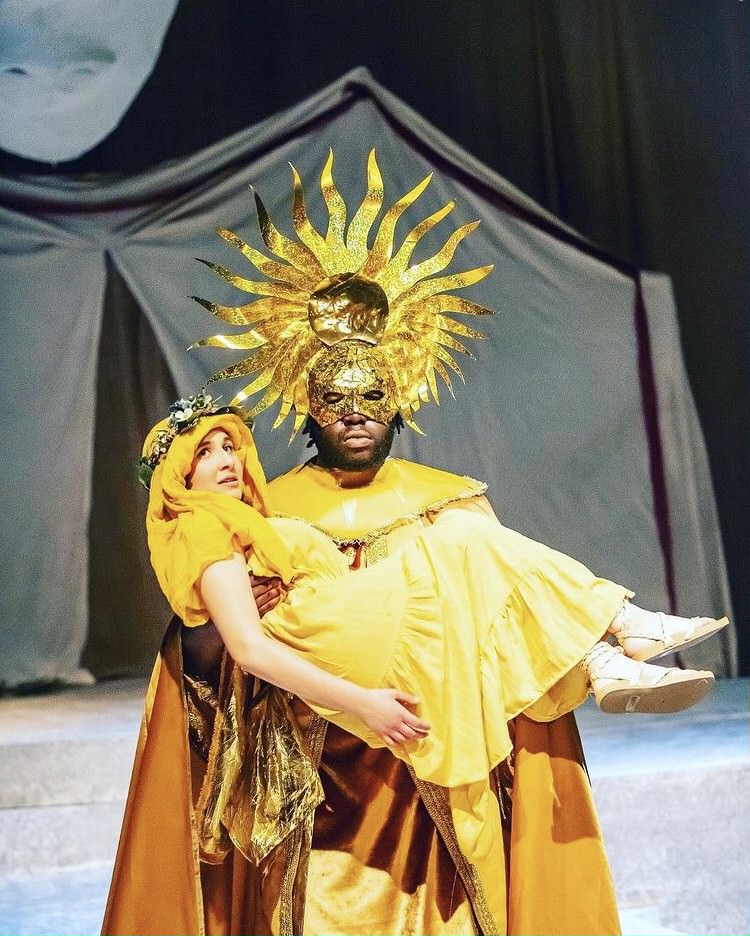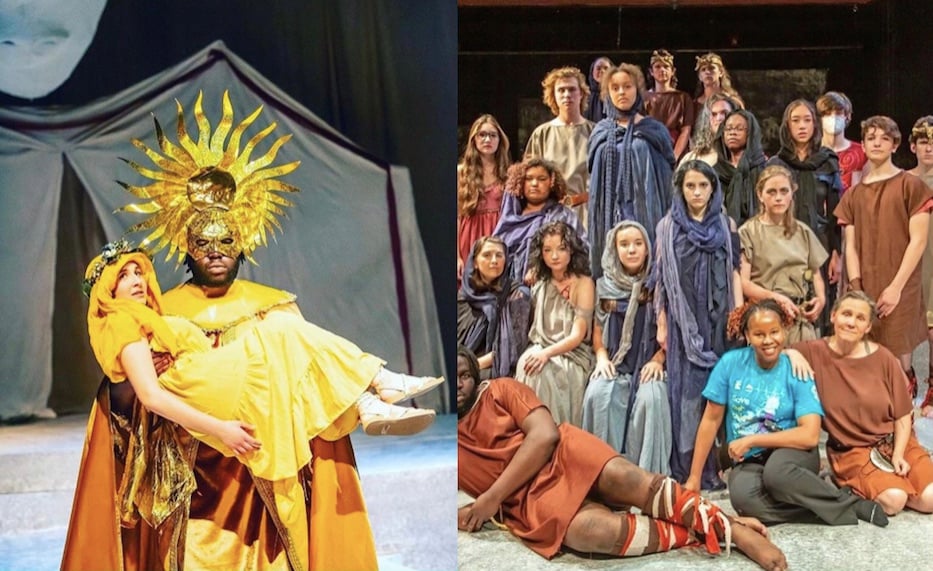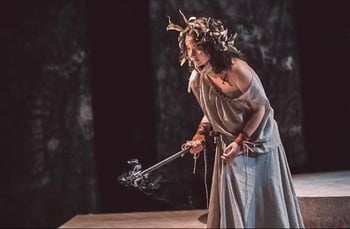
Citizen Contributions | Arts & Culture | Theater | Oddfellows Playhouse Youth Theater

Contributed Photos.
“We all have grief and that grief is very real,” Marcella Trowbridge told the cast of The Greeks before actors took the stage. It was opening night at Oddfellows Playhouse Youth Theater, and the cast was all ears.
The Greeks, a distillation of Euripides' Iphigenia at Aulis and The Trojan Women, ran at Oddfellows Playhouse from May 19 through 28. Co-directed by Trowbridge and Oddfellows Executive Artistic Director Dic Wheeler, the show took dark and heavy material, fused it with a teenage theater company, and provided an unlikely vessel for the grief so many teens have experienced recently as a result of the ongoing pandemic, gun violence, and war.
Choosing to produce The Greeks today proved to be poignant and effective as violence and pain persists in the world around us.
As an actor in The Greeks, I found that the first act addressed men and the wars men make, while the second act dealt with women and the effects these wars have on women. Some of the themes—like nationalism and toxic masculinity—rang eerily true to this day and age.
In The Trojan Women, Paris, the Trojan warrior, has taken Helen (Skyler Keoppen), the most beautiful woman in the world, from her husband Menelaus (played in act two by Ethan Bardoe). All the Greeks have vowed to protect Helen. When she is captured by Paris, it becomes cause for war on Troy.
 Gabriel Armstrong, who played Menelaus in act one (Iphigenia at Aulis) commented on the absurdity of this scenario. He pointed out how Menelaus’s damaged pride over losing his wife would cause vast turmoil and suffering for many, and how one man’s injured masculinity was so detrimental to so many innocent people.
Gabriel Armstrong, who played Menelaus in act one (Iphigenia at Aulis) commented on the absurdity of this scenario. He pointed out how Menelaus’s damaged pride over losing his wife would cause vast turmoil and suffering for many, and how one man’s injured masculinity was so detrimental to so many innocent people.
In Iphigenia at Aulis, Agamemnon (Quinn Pedersen), the brother of Menelaus and general of the Greeks, faces a larger conflict. In the work, Agamemnon does not know whether or not he should sacrifice his daughter Iphigenia (Sofia Hurlbert) to the goddess Artemis in order to get the wind back. If he does, the Greek fleet can sail to Troy. Agamemnon and Menelaus see the impending Trojan War as a necessary evil, both of them prioritizing the idea of their house and lineage over human life.
There’s a lesson there: Agamemnon too is a victim of his own pride and insecurity about his abilities as a leader. This pride leads him to make the ultimate nationalist decision. He sacrifices his beloved daughter so he can lead his army and take Troy.
The Greeks rang true to many actors as they dug deeper and deeper within their characters. Wheeler urged us, as actors, to become more rooted in our roles and inhabit them to the fullest so we could experience the full range of emotion the piece had to offer. As more and more actors descended into this ancient world, we uncovered more layers of emotion, leading some to break out in tears on stage.
This happened, for instance, during the heartbreaking monologues of Queen Clytemnestra (Trinity Norfleet) as she attacked Agamemnon for his brutality. It happened for Princess Iphigenia as she tearfully accepted her fate, asking “what is so precious about this life of mine?”
The process of engaging with the subject matter in The Greeks was a deep and emotional one. As actors, we were pushed to channel our own painful experiences into the play as a way of healing and letting go. Trowbridge pointed out to the cast that due to technology, it is impossible not to know what is going on in the world around us. Throughout the production, we were all aware of the constant violence of war overseas, gun violence in the U.S., and violence and loss in our very own state and cities. We continuously noticed parallels between the modern world and the ancient world Euripidies wrote so vividly about.
“Why do men like you have to exist?” cried Cassandra (Theresa Carlton) of Agamemnon in the second act (The Trojan Women).This line rang true with the cast as members recalled the shock of hearing of the potential to overturn Roe v. Wade or the shallow words of lawmakers when asked about gun safety in America.
While working on The Trojan Women, it was impossible for us to avoid the brutal mistreatment of women that continues today. Rape and sexual aggression as war tactics originated in ancient times, and still persist today. In the works, the Greeks treat women as though they are a commodity, and not as human beings. They hold tremendous value over the possession of a woman, but likewise inflict great pain and suffering upon them.
With this in mind, the second act evoked even more emotion for many cast members. The Trojan Women sees Troy destroyed. Many heroes are dead, and the Greeks bring the Trojan women back to Greece to be enslaved. The war that the men made in the first act, in all of its alleged glory, has concluded and left behind death and destruction.
Andromache (Julia Weston), the daughter of Priam, King of Troy, wails and mourns the death of her husband, Hector, and the forthcoming murder of her baby boy Astyanax.
“Your father has killed you by being so brave,” Andromache cries to baby Astyanax (Brianna Reid). Even the so-called heroes of these wars inflict great suffering on those they care about.
The show provided a refuge for both the cast and audience to feel the full spectrum of their emotions in an honest way.
In order to heal we must live with our grief, we must express it and inhabit it as the cast of The Greeks did. Trowbridge’s line that “we all have grief and that grief is very real” is one that she told us continuously throughout production. With a refuge or a safe place for expression, we are able to evict parts of our grief and sadness. We may not be healed, but we’re a step closer.
I challenge you to find an outlet for your grief. Do not let it be masked while you search for hope.
Alec Pedersen is a student at Wilbur Cross and the Educational Center for the Arts. To submit a citizen contribution, contact lucy@newhavenarts.org.

